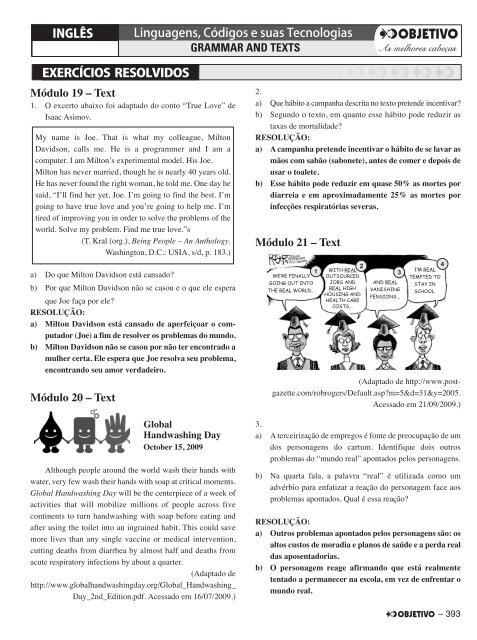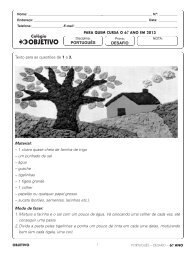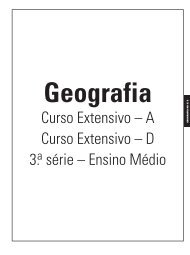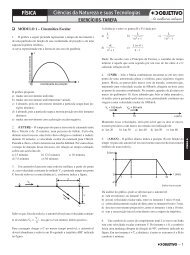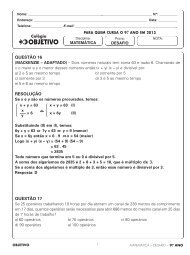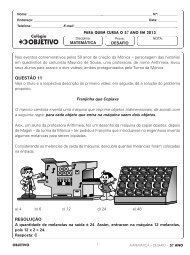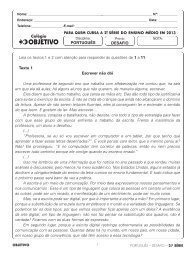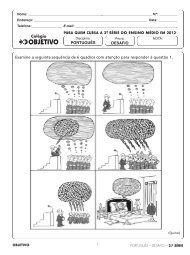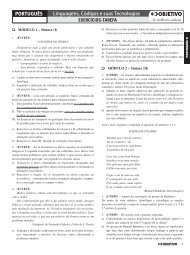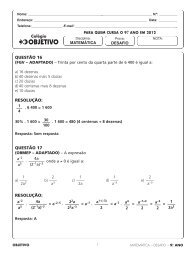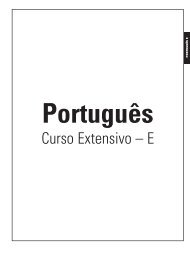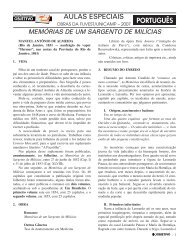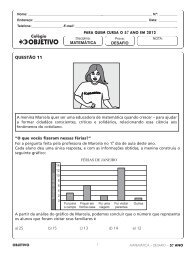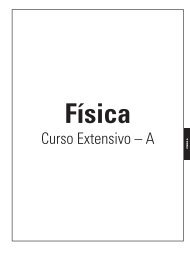You also want an ePaper? Increase the reach of your titles
YUMPU automatically turns print PDFs into web optimized ePapers that Google loves.
Módulo 19 – Text<br />
1. O excerto abaixo foi adaptado do conto “True Love” de<br />
Isaac Asimov.<br />
My name is Joe. That is what my colleague, Milton<br />
Davidson, calls me. He is a programmer and I am a<br />
computer. I am Milton’s experimental model. His Joe.<br />
Milton has never married, though he is nearly 40 years old.<br />
He has never found the right woman, he told me. One day he<br />
said, “I’ll find her yet, Joe. I’m going to find the best. I’m<br />
going to have true love and you’re going to help me. I’m<br />
tired of improving you in order to solve the problems of the<br />
world. Solve my problem. Find me true love.”s<br />
(T. Kral (org.), Being People – An Anthology.<br />
Washington, D.C.: USIA, s/d, p. 183.)<br />
a) Do que Milton Davidson está cansado?<br />
b) Por que Milton Davidson não se casou e o que ele es pe ra<br />
que Joe faça por ele?<br />
RESOLUÇÃO:<br />
a) Milton Davidson está cansado de aperfeiçoar o com -<br />
putador (Joe) a fim de resolver os problemas do mundo.<br />
b) Milton Davidson não se casou por não ter encon trado a<br />
mulher certa. Ele espera que Joe resolva seu problema,<br />
encontrando seu amor verdadeiro.<br />
Módulo 20 – Text<br />
Global<br />
Handwashing Day<br />
October 15, 2009<br />
Although people around the world wash their hands with<br />
water, very few wash their hands with soap at critical moments.<br />
Global Handwashing Day will be the centerpiece of a week of<br />
activities that will mobilize millions of people across five<br />
continents to turn handwashing with soap before eating and<br />
after using the toilet into an ingrained habit. This could save<br />
more lives than any single vaccine or medical intervention,<br />
cutting deaths from diarrhea by almost half and deaths from<br />
acute respiratory infections by about a quarter.<br />
(Adaptado de<br />
http://www.globalhandwashingday.org/Global_Handwashing_<br />
Day_2nd_Edition.pdf. Acessado em 16/07/2009.)<br />
GRAMMAR AND TEXTS<br />
2.<br />
a) Que hábito a campanha descrita no texto pretende incentivar?<br />
b) Segundo o texto, em quanto esse hábito pode reduzir as<br />
taxas de mortalidade?<br />
RESOLUÇÃO:<br />
a) A campanha pretende incentivar o hábito de se lavar as<br />
mãos com sabão (sabonete), antes de comer e depois de<br />
usar o toalete.<br />
b) Esse hábito pode reduzir em quase 50% as mortes por<br />
diarreia e em aproximadamente 25% as mor tes por<br />
infecções respiratórias severas.<br />
Módulo 21 – Text<br />
(Adaptado de http://www.postgazette.com/robrogers/Default.asp?m=5&d=31&y=2005.<br />
Acessado em 21/09/2009.)<br />
3.<br />
a) A terceirização de empregos é fonte de preocupação de um<br />
dos personagens do cartum. Identifique dois outros<br />
problemas do “mundo real” apontados pelos persona gens.<br />
b) Na quarta fala, a palavra “real” é utilizada como um<br />
advérbio para enfatizar a reação do personagem face aos<br />
problemas apontados. Qual é essa reação?<br />
RESOLUÇÃO:<br />
a) Outros problemas apontados pelos personagens são: os<br />
altos custos de moradia e planos de saúde e a perda real<br />
das aposentadorias.<br />
b) O personagem reage afirmando que está real mente<br />
tentado a permanecer na escola, em vez de enfrentar o<br />
mundo real.<br />
– 393
Módulo 22 – Text<br />
Cocooning<br />
Cocooning describes a phenomenon whereby people will<br />
want to stay inside the safety and comfort of their homes in<br />
gated communities. This is partially due to the constant<br />
circulation of frightening images in the mass media. Thus,<br />
people will do more from their homes; they will spend more<br />
money to make their homes comfortable and complete. As a<br />
result, jobs related to home entertainment systems and home<br />
remodeling will abound.<br />
4.<br />
a) A que fenômeno se refere o termo “cocooning”?<br />
b) A que se deve esse fenômeno, segundo o autor do tex to?<br />
RESOLUÇÃO:<br />
a) O termo “cocooning” refere-se ao fenômeno em que as<br />
pessoas preferem permanecer na segurança e conforto<br />
de seus lares em comunidades fechadas.<br />
b) Esse fenômeno deve-se à constante circulação de ima -<br />
gens assustadoras nos meios de comunicação de massa.<br />
Módulo 23 – Grammar – Passive Voice<br />
5. Shakespeare wrote Hamlet.<br />
394 –<br />
(Adaptado de http://www.careerplanner.com/Career-<br />
Articles/Hot_Jobs.cfm#HotJobs.<br />
Acessado em 18/10/2009.)<br />
Hamlet was written by Shakespeare.<br />
6. Jim is going to paint the wall.<br />
The wall is going to be painted by Jim.<br />
7. Mr. Dawson eats avocado with sugar.<br />
Avocado is eaten with sugar by Mr. Dawson.<br />
8. The police have arrested many thieves.<br />
Many thieves have been arrested by the police.<br />
9. People say that she is rich.<br />
It’s said that she is rich.<br />
She is said to be rich.<br />
10. John sent Sheila many flowers.<br />
Many flowers were sent to Sheila.<br />
Sheila was sent many flowers.<br />
Módulo 24 – Text<br />
AID WITH LESS BAGGAGE<br />
By Silvia Spring<br />
The last thing you’d probably expect to see a<br />
Malawian drought victim do is whip out her ATM<br />
card and pull cash out of a machine. But that’s<br />
exactly how some aid recipients in this beleaguered African<br />
nation now receive their monthly entitlements. […]<br />
It’s a novel development idea that’s catching on<br />
around the world. Until recently, most of the world’s relief<br />
aid came in the form of material goods like food, water,<br />
blankets, medicines or building materials, delivered by<br />
international staff that parachute into disaster areas, or<br />
local NGOs funded by rich donors. But in recent years, as<br />
the nonprofit world increasingly come under fire for<br />
inefficiency, mismanagement and even corruption, there<br />
has been a push for new strategies. Cash aid, which has<br />
been delivered to about 100,000 aid recipients in<br />
countries like Bangladesh, Pakistan, and Ethiopia via<br />
pilot programs, is one of them.<br />
The idea behind cash aid is to cut the cost of aid<br />
delivery, reduce opportunities for corruption and theft of<br />
goods, and empower aid recipients by giving them more<br />
control over their own well-being. […]<br />
(Newsweek, June 11, 2007: 35.)<br />
Com base no texto I, responda às questões 11 e 12 em português<br />
e à questão 13 em inglês.<br />
11. No que diz respeito à maneira como a ajuda humanitária<br />
internacional é implementada, explicite:<br />
a) o procedimento convencional;<br />
b) o procedimento inovador.<br />
RESOLUÇÃO:<br />
a) O procedimento convencional é a distribuição de bens<br />
de primeira necessidade.<br />
b) O procedimento inovador é a ajuda em dinheiro.<br />
12. Cite dois problemas que esse novo procedimento visa evitar.<br />
RESOLUÇÃO:<br />
Dois dentre os seguintes:<br />
– os custos de transporte de mercadorias<br />
– corrupção por parte dos gestores<br />
– roubo de mercadorias<br />
– ineficiência das ONGs<br />
– má gestão na condução da ajuda<br />
13. Transcreva do texto os termos que foram substituídos por:<br />
a) “their” (linha 5); b) “them” (linha 17).<br />
RESOLUÇÃO:<br />
a) (some) aid recipients (in this beleaguered African nation)<br />
b) (new) strategies<br />
5<br />
10
Módulo 19 – Text<br />
Losing Weight<br />
It’s all in the snacks<br />
Most people see losing weight as a 24/7 battle<br />
against fat, calories and overeating – in other<br />
words, a battle they’re sure to lose. But a new<br />
survey by Nutricise, an online weight-loss program<br />
(nutricise.com), suggests that skirmishes may work better than<br />
all-out war. Nearly all the 400 people surveyed said they usually<br />
overate at the same time every day. Just under a third tended to<br />
wolf down goodies in the afternoon; more than a third gorged<br />
during prime-time television hours. Candies, cookies and<br />
doughnuts were the main temptations, providing many noshers<br />
with 300 to 500 calories per snack.<br />
With a target that fat, you don’t have to change your whole<br />
diet to lose weight. Suppose you could shave just 100 calories<br />
out of the daily indulgence – by forgoing a cookie or a third of<br />
a candy bar, or by substituting frozen yogurt for premium<br />
icecream. If you persevered, you would lose approximately 10<br />
pounds over the course of a year, even while leaving the rest of<br />
your diet alone. Small sacrifice, big return.<br />
(Newsweek)<br />
1. The text is mainly about<br />
a) the way the obese are losing weight.<br />
b) the ideal number of calories a person should intake a day.<br />
c) a daily indulgence.<br />
d) a new kind of diet.<br />
e) the benefits of being a couch-potato.<br />
2. The survey mentioned in the text has found that<br />
a) it’s nearly impossible to lose weight if you eat too much in<br />
the afternoon.<br />
b) you won’t regain what you lost if you quit premium<br />
icecream.<br />
c) by reducing 100 calories out of your daily diet, you may<br />
lose about 5 kilos in a year.<br />
d) if you really want to lose weight, you have to reschedule all<br />
your diet.<br />
e) you won’t put on weight if you overeat at the same time<br />
every day.<br />
3. A synonym for “to gorge” is<br />
a) to squeeze. b) to fast. c) to eat greedily.<br />
d) to eat less. e) to chew.<br />
Vocabulary<br />
a 24/7 battle = uma batalha constante<br />
skirmishes = conflitos<br />
all-out war = guerra total<br />
to wolf down = devorar<br />
goodies = guloseimas<br />
noshers = “aqueles que gostam de beliscar”<br />
target = objetivo, alvo<br />
to shave out = reduzir<br />
to forgo = abrir mão de, renunciar a<br />
– 395
Módulo 20 – Text<br />
Vacation Homes<br />
396 –<br />
There's no Place like Home<br />
There was a time when only royalty and the very rich<br />
owned vacation homes abroad. That's changed. Though money<br />
still helps, in the last few years holidaying in your own overseas<br />
property has become much more common. “There is no doubt<br />
that the vacation-home market has recently increased in<br />
popularity,” says Piers Brunner, a managing director.<br />
People are buying these secondary homes because, well,<br />
they can. More and more countries now allow foreigners to own<br />
property at relatively affordable prices. Elsewhere, developers<br />
now step in to take care of the legalities. And though experts<br />
say that most people still buy real estate within a four-hour ride<br />
of their primary residence, improved travel routes have opened<br />
up new markets, especially in Asia and Europe. Among the<br />
hottest new destinations: Sri Lanka, Spain and Hungary.<br />
Buying a vacation home can also be a good investment.<br />
Henrietta Wheatman earned $50,000 last year by renting out her<br />
Thai villa, more than offsetting the $24,000 it costs annually to<br />
maintain and staff the house. All her vacation homes have<br />
appreciated up to 100 percent, and practically pay for<br />
themselves through rentals brought in by referrals and Web<br />
sites.<br />
(adapted from Newsweek)<br />
1. According to the passage,<br />
a) more and more people would rather spend their holidays in<br />
their own countries.<br />
b) people are increasingly buying vacation properties abroad.<br />
c) most people still buy vacation properties distant from<br />
home.<br />
d) you have to be very wealthy to buy a holiday home since<br />
prices have been increasing lately.<br />
e) holidaying overseas is surely cheaper than holidaying in<br />
your own city.<br />
2. Henrietta Wheatman<br />
a) intends to buy properties in Sri Lanka, Spain and Hungary.<br />
b) has paid around $24,000 for her Thai vacation property.<br />
c) 's houses have developed into a highly profitable business.<br />
d) has been living overseas since she decided to buy a house<br />
in Thailand.<br />
e) regrets having bought so many holiday homes.<br />
3. In: "Though money still helps, ...”, the underlined word is<br />
closest in meaning to:<br />
a) Despite the fact. b) So. c) However.<br />
d) But. e) Because.<br />
to allow = permitir<br />
Vocabulary<br />
affordable prices = preços acessíveis<br />
elsewhere = em outros lugares<br />
though = embora<br />
real estate = bens imobiliários<br />
to rent out = alugar<br />
to offset = compensar<br />
rentals = aluguéis<br />
experts = especialistas<br />
estate = propriedades, bens<br />
False Friends<br />
Atenção: estes também são “false friends”<br />
to push = empurrar<br />
to realize = compreender
Módulo 21 – Text<br />
Pyramids<br />
Synthetic stones clue to<br />
mystery of pyramids<br />
A French industrial chemist says he has discovered how<br />
the ancient Egyptians built the great pyramids of Giza with only<br />
primitive tools–they poured their own synthetic stones one on<br />
top of another.<br />
‘We have now studied the stones from a chemical and a<br />
microscopic point of view and we have proof they are<br />
synthetic,’ Dr Joseph Davidovits told the Miami Herald.<br />
He said a strand of hair gave him the clue to the puzzle that<br />
has baffled scholars for nearly 5,000 years.<br />
Archaeologists have long wondered how a society without<br />
sophisticated machinery hauled millions of blocks of stone from<br />
pits that were miles away and then stacked them up to 40 storeys<br />
high.<br />
Some have theorised that brute strength or pulleys were the<br />
key. Others have even credited extra-terrestrial creatures with<br />
the feat.<br />
Davidovits said his tests on five small casing stones from<br />
the largest of the great pyramids showed they were composed<br />
of a limestone fossil-shell concrete. He said the substance was<br />
bound together so well that it almost could not be distinguished<br />
from natural stone.<br />
He says his theory is proved by a two and a half centimetre<br />
long strand of human hair found encased in one of the stones.<br />
The hair fell into the mixture when the pyramid was being<br />
poured, he said.<br />
‘We think the mixture was transported in baskets that<br />
weighed 20 or 30 pounds,’ said Davidovits, ‘It wasn’t easy for<br />
the Egyptians but they did not need 50,000 or 100,000 workers<br />
as is assumed. We speculate there were 1,500 workers on site.’<br />
(Miami Herald)<br />
1. How could the French chemist prove that the great<br />
pyramids were built with synthetic stones?<br />
a) He used primitive tools.<br />
b) He used a microscope.<br />
c) He discovered that the Egyptians had used strength or<br />
pulleys.<br />
d) He saw a long strand of human hair in a stone.<br />
e) He was aware that extra-terrestrial creatures had built the<br />
pyramids.<br />
2. Why were scholars baffled for nearly 5,000 years?<br />
a) Because they discovered the stones of the pyramids were<br />
synthetic.<br />
b) Because there were 50,000 or 100,000 workers building<br />
the pyramids.<br />
c) Because the substance was bound together so well it could<br />
not be distinguished from natural stone.<br />
d) Because a long strand of human hair was found encased in<br />
one of the stones.<br />
e) They couldn't explain how the workers could have<br />
transported millions of blocks of stones to build the pyramids.<br />
3. According to the chemist, how was the mixture of the<br />
stones transported?<br />
a) With a system of pulleys.<br />
b) There were 50,000 or 100,000 workers to do this job.<br />
c) There were 1,500 workers to do this job.<br />
d) In baskets.<br />
e) With primitive tools.<br />
tools = ferramentas<br />
to pour = descarregar<br />
Vocabulary<br />
a strand of hair = um fio de cabelo<br />
clue = dica<br />
to baffle = intrigar<br />
to haul = puxar<br />
to stack up = empilhar<br />
limestone = calcário<br />
Double Sense Words<br />
chemist = { químico<br />
farmacêutico<br />
to wonder = maravilhar-se { querer saber, perguntar-se<br />
Atenção<br />
figure = figura<br />
{ número<br />
{ leve<br />
{ principal<br />
faint = desmaio<br />
major = major<br />
minute = minuto { mínimo<br />
– 397
Módulo 22 – Text<br />
Birds<br />
The extinction of many species of birds has undoubtedly been hastened by modern man; since 1600 it has been estimated that<br />
approxi mately 100 bird species have become extinct over the world. In North America, the first species known to be annihilated was<br />
the great auk, a flightless bird that served as an easy source of food and bait for Atlantic fishermen through the beginning of the<br />
nineteenth century.<br />
1. You may deduce from the passage that the great auk<br />
disappeared<br />
a) before 1600. b) in the 1600s.<br />
c) in the 1800s. d) in the 1900s.<br />
e) in the last fifty years.<br />
2. It can be inferred from the passage that the great auk was<br />
killed because<br />
a) it was eating the fishermen's catch.<br />
b) fishermen used to eat it.<br />
c) it flew over fishing areas.<br />
d) it baited fishermen.<br />
e) it couldn't find anything to eat.<br />
3. “To be hastened”, in the text, could be translated as<br />
a) ser liderada. b) ser concluída.<br />
c) ser prejudicada. d) ser interrompida.<br />
e) ser acelerada.<br />
398 –<br />
auk = alca (ave)<br />
bait = isca<br />
Vocabulary<br />
Atenção<br />
Não confunda<br />
{ source of<br />
(= fonte)<br />
heat<br />
energy<br />
light<br />
comfort<br />
pride<br />
disappointment<br />
{ resource of<br />
(= recurso)<br />
(= reservas)<br />
money<br />
skills<br />
uranium<br />
oil<br />
coal
Módulo 23 – Grammar – Passive Voice<br />
1. Change active to passive:<br />
Someone is going to announce the results of the contest.<br />
The results of the contest ............................. .<br />
a) were announced b) was announced<br />
c) have been announced d) are going to announce<br />
e) are going to be announced<br />
2. Change active to passive:<br />
The carpenter has fixed this chair several times.<br />
This chair ........................ by the carpenter several times.<br />
a) was fixed b) had been fixed<br />
c) has been fixing d) had fixed<br />
e) has been fixed<br />
3. The active voice of “The coffee was being made when I<br />
walked into the kitchen” is:<br />
........................................ when I walked into the kitchen.<br />
a) Someone made the coffee<br />
b) They were made the coffee<br />
c) Somebody have made the coffee<br />
d) They were making the coffee<br />
e) Someone were making the coffee<br />
4. Change active to passive:<br />
A bee stung Alice while she was sitting in the garden.<br />
....................................... while she was sitting in the garden.<br />
a) Alice was sting by a bee.<br />
b) Alice was stung by a bee.<br />
c) Alice has been stung by a bee.<br />
d) Alice stings a bee.<br />
e) Alice was stinging by a bee.<br />
5. Change active to passive:<br />
People say that she sings well.<br />
a) People is said that she sings well.<br />
b) She is said that she sings well.<br />
c) She is said to sing well.<br />
d) People are said that she sings well.<br />
e) She sings well is said.<br />
6. The active voice of “Peter should be told about his grades”<br />
is:<br />
a) Someone should tell Peter about his grades.<br />
b) They should to tell Peter about his grades.<br />
c) They should have told Peter about his grades.<br />
d) Peter should tell him about his grades.<br />
e) Somebody told Peter about his grades.<br />
7. Change active to passive:<br />
Nobody told me that the teacher was in hospital.<br />
....................... that the teacher was in hospital.<br />
a) I have been told b) I wasn’t told<br />
c) I was told d) I hadn’t been told<br />
e) They didn’t tell me<br />
8. Change active to passive:<br />
Is Jack closing the windows?<br />
a) The windows are being closed by Jack?<br />
b) Have the windows been closed by Jack?<br />
c) Are the windows closing Jack?<br />
d) Are the windows being closed by Jack?<br />
e) Are the windows been closed by Jack?<br />
9. The active voice of “The report wasn’t written by the<br />
employees” is:<br />
a) The employees haven’t written the report.<br />
b) The employees didn’t wrote the report.<br />
c) The employees hadn’t written the report.<br />
d) The employees weren’t writing the report.<br />
e) The employees didn’t write the report.<br />
10. Change active to passive:<br />
Drivers must obey certain rules.<br />
Certain rules ............... by drivers.<br />
a) must have obeyed b) has to be obeyed<br />
c) must be obeyed d) must to be obeyed<br />
e) must be obeying<br />
11. Change active to passive:<br />
Someone has stolen his wallet.<br />
His wallet ....................... .<br />
a) is stolen b) has been stolen<br />
c) was stolen d) had been stolen<br />
e) stole<br />
12. Change active to passive:<br />
Someone is considering Jennifer for that job.<br />
a) Jennifer is considered for that job.<br />
b) Jennifer was considered for that job.<br />
c) Jennifer will be considered for that job.<br />
d) Jennifer is being considered for that job.<br />
e) Jennifer has been considered for that job.<br />
– 399
Módulo 24 – Text<br />
400 –<br />
NEVER AS GOOD AS AT HOME<br />
Don't forget the Marmite, love<br />
It’s not unusual to pack a few home comforts when you jet<br />
off on holiday – but scores of Britons take black pudding,<br />
milk and bacon along with their swimwear and sun cream.<br />
They are just three bizarre items that holidaymakers admit to<br />
taking abroad with them, dismissing foreign alternatives as<br />
‘never as good as at home’. Other must-haves include real ale,<br />
English mustard, Marmite and quilted toilet paper, a survey<br />
found.<br />
A 35-year-old legal expert told RAC researchers that he<br />
refused to travel without British condoms because he ‘did not<br />
trust dodgy Spanish ones’, and a devoted husband said he<br />
always packed a 15ft extension cable so his wife could use her<br />
hairdryer anywhere. One 43-year-old woman took bleach and<br />
rubber gloves in her suitcase to give the bathroom ‘a good<br />
going-over’ when she arrived.<br />
(Metro)<br />
1. The survey, mentioned in the text, showed that<br />
a) most Britons prefer to spend their holidays in a foreign<br />
country.<br />
b) most Britons don’t take their swimwear with them when<br />
they travel abroad.<br />
c) beer is an item that British holidaymakers admit to taking<br />
abroad with them.<br />
d) Britons usually feel uncomfortable when they are in a<br />
foreign country.<br />
e) Britons are advised not to take black pudding with them<br />
when they travel abroad.<br />
2. In:<br />
“They are just three bizarre items that holidaymakers…”,<br />
the underlined word is closest in meaning to<br />
a) strange. b) common.<br />
c) familiar. d) helpful.<br />
e) valuable.<br />
3. In:<br />
“He did not trust dodgy Spanish ones”, the verb to trust<br />
could be translated as<br />
a) comprar. b) aceitar.<br />
c) usar. d) confiar.<br />
e) elogiar.<br />
ale = espécie de cerveja<br />
toilet paper = papel higiênico<br />
condoms = preservativos<br />
dodgy = não confiáveis<br />
bleach = alvejante<br />
Vocabulary<br />
“a good going-over” = “uma boa limpada”<br />
expert = especialista<br />
Atenção:<br />
False Friends<br />
Lembre-se destes importantes “false friends”<br />
to record = gravar<br />
to retire = aposentar-se


